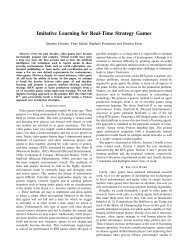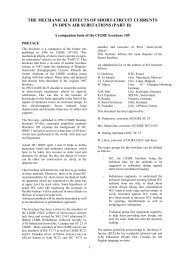Session 1 - Montefiore
Session 1 - Montefiore
Session 1 - Montefiore
You also want an ePaper? Increase the reach of your titles
YUMPU automatically turns print PDFs into web optimized ePapers that Google loves.
the societal cost of asthma has been estimated at<br />
3 billion euro/year. Although current legislation<br />
restricts the emission of harmful substances, certain<br />
extreme events facilitated by climatic conditions,<br />
or even accidents, are of concern given the large<br />
number of people potentially exposed to these<br />
threats. Moreover, the impact of air pollution is<br />
becoming a global problem as a consequence of<br />
long-distance transportation of bio-accumulative<br />
substances.<br />
The level of air pollution exposure in the densely<br />
developed centres of cities may often be at<br />
higher levels than the suburbs due to the greater<br />
concentrations and slower movement of traffic.<br />
However, the noise produced by all vehicles, and<br />
the rapid growth in transport, particularly air and<br />
road transport, is more ubiquitous and has resulted<br />
in well over 120 million people throughout the<br />
EU being exposed to noise levels affecting their<br />
well-being.<br />
Sprawl related growth of urban transport and<br />
greenhouse gas emissions have major implications<br />
for global warming and climate change, with the<br />
expectation of increasingly severe weather events in<br />
the coming years and increased incidences of river<br />
and coastal flooding. The risks from the continued<br />
development of these areas in the context of a<br />
changing climate is evident in the recent major<br />
floods in Europe that have affected large urban<br />
populations. The floods in central Europe in August<br />
2002 caused 112 casualties and over 400 000 people<br />
were evacuated from their homes. These expected<br />
transformations pose major challenges for urban<br />
planning that are clearly focussed on the growth of<br />
urban sprawl along the coastal fringes throughout<br />
Europe, as well as development of sprawling<br />
extensions across greenfield sites in the river valleys<br />
and lowlands of Europe.<br />
The more general permanent flooding of the coastal<br />
regions of Europe due to rising sea levels and<br />
climate change is particularly worrying considering<br />
the concentration of urban populations along the<br />
coasts and the importance of these areas for tourism.<br />
The countries of Europe most vulnerable to coastal<br />
flooding include the Netherlands and Belgium,<br />
where more than 85 % of the coast is under 5 m<br />
elevation. Other countries at risk include Germany<br />
and Romania where 50 % of the coastline is below<br />
5 m, Poland (30 %) and Denmark (22 %), as well<br />
as France, the United Kingdom and Estonia where<br />
lowlands cover 10–15 % of the country.<br />
Overall, 9 % of all European coastal zones lie below<br />
5 m elevation. Even with conservative estimates of<br />
The impacts of urban sprawl<br />
predictions for sea level rise, a substantial part of the<br />
population of Europe living in the coastal regions<br />
are highly vulnerable to sea level rise and flooding.<br />
It is clear that this is not a specific issue generated<br />
by urban sprawl, however, the management of these<br />
risks and planning for adaptation will be made more<br />
complicated if urban sprawl is not controlled.<br />
Furthermore, the majority of coastal lowlands have<br />
ageing defense systems and considerable resources<br />
are needed to maintain and improve these systems<br />
in order to provide the capacity to withstand the<br />
predicted rise in sea levels. In addition and just as<br />
important is the fundamental need for new visions<br />
for urban and regional planning policy that respond<br />
to these challenges. These visions must recognise<br />
that continued sprawl in the coastal regions of<br />
Europe is fundamentally unsustainable.<br />
Finally, a further emerging issue is worth reporting:<br />
urban areas and their hinterlands are becoming<br />
increasingly vulnerable to geo-problems controlled<br />
by geological processes. The total cost of these<br />
problems to society ranges from major hazards<br />
(such as volcanic eruptions, earthquakes, floods,<br />
land subsidence, landslides) to minor hazards<br />
(such as local swelling or shrinking of clays in<br />
foundations). Reworking and removal of the soil<br />
surface by construction can unbalance watersheds<br />
and landscapes, contributing to the loss of biological<br />
diversity, ecosystem integrity and productivity, as<br />
well as to land degradation and erosion.<br />
4.2 Socio-economic impacts<br />
From a social perspective urban sprawl generates<br />
greater segregation of residential development<br />
according to income, as mentioned in Chapter 3.<br />
Consequently, it can exacerbate urban social and<br />
economic divisions. The socio-economic character<br />
of suburban and peripheral areas is typified by<br />
middle and upper income families with children,<br />
who have the necessary mobility and lifestyle to<br />
enable them to function effectively in these localities.<br />
However, the suburban experience for other groups,<br />
including the young and old, who lack mobility and<br />
resources can be very different and can reduce social<br />
interaction. Furthermore, large segments of urban<br />
society are excluded from living in such areas.<br />
Social polarisation associated with urban sprawl is<br />
in some cities so apparent that the concept of the<br />
'divided' or 'dual' city has been applied to describe<br />
the divisions between the inner city core and the<br />
suburban outskirts. In the inner city, poor quality<br />
neighbourhoods often house a mix of unemployed<br />
Urban sprawl in Europe 35











